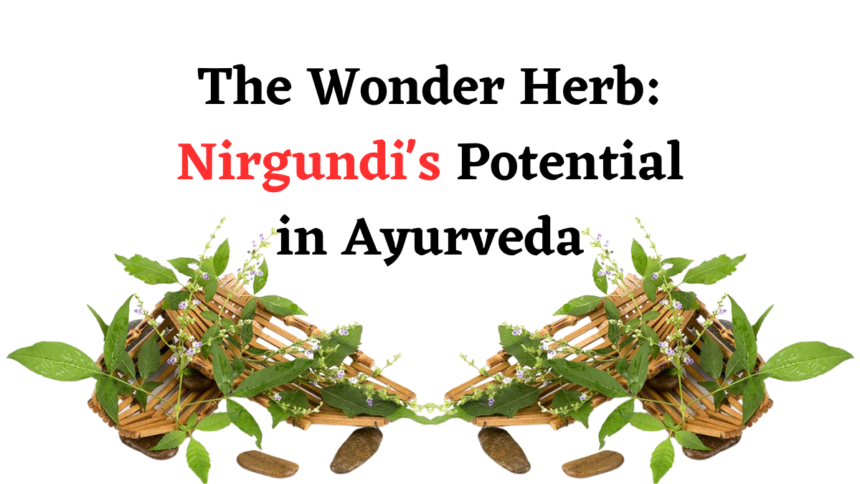The Wonder Herb: Nirgundi’s Potential in Ayurveda

Introduction
Nirgundi’s Potential in Ayurveda (Vitex negundo), a shrub or small tree commonly found in India, has earned a reputation as a medicinal powerhouse in Ayurveda. Often referred to as “sarvaroganivarini,” which translates to “remedy for all diseases,” Nirgundi’s leaves and roots have been used for centuries to address a wide range of ailments, The Wonder Herb: Nirgundi’s Potential in Ayurveda.
Ayurvedic Properties of Nirgundi
According to Ayurveda, the ancient Indian system of medicine, Nirgundi possesses specific characteristics that influence its therapeutic effects. It’s considered to have:
- Rasa (taste): Katu (pungent), Tikta (bitter), Kashaya (astringent)
- Guna (qualities): Laghu (light), Ruksha (dry)
- Virya (potency): Ushna (hot)
- Vipaka (post-digestive effect): Katu (pungent)
People believe these properties balance Vata (air) and Kapha (phlegm) doshas, which are the three biological energies that govern our health in Ayurveda.
Potential Benefits of Nirgundi
Traditionally, in Ayurveda, people have used Nirgundi to manage various conditions, including:
- Respiratory problems: People think Nirgundi’s Ushna (hot) virya loosens mucus and alleviates coughs and bronchitis.
- Inflammation and pain: People believe its Laghu (light) and Ruksha (dry) qualities reduce inflammation and pain associated with arthritis and rheumatism.
- Skin disorders: The astringent and blood purifying properties of Nirgundi may be beneficial for treating skin conditions like wounds, ulcers, and eczema.
- Digestive issues: Nirgundi’s digestive stimulant properties might aid digestion and address conditions like constipation and bloating.
- Neurological disorders: Emerging research suggests Nirgundi’s neuroprotective effects may hold promise for managing neurological conditions.
Important Considerations
While Nirgundi offers a range of potential benefits, it’s crucial to remember:
- Consult an Ayurvedic practitioner: Experts do not recommend self-diagnosis and treatment. A qualified Ayurvedic doctor can assess your individual needs and determine if Nirgundi is suitable for you.
- Dosage and preparation: The condition being treated will determine the appropriate dosage and preparation of Nirgundi. It’s important to follow the guidance of a healthcare professional.
- Potential side effects: Nirgundi may interact with certain medications or cause side effects in some individuals. It’s essential to disclose any existing medical conditions and medications to your Ayurvedic practitioner.
Conclusion
Nirgundi’s place in Ayurveda reflects its potential as a versatile medicinal herb. However, its use requires a responsible and informed approach. Consulting an Ayurvedic practitioner can help you explore the potential benefits of Nirgundi while ensuring its safe and appropriate use in your healthcare regimen.
Nirgundi (Vitex negundo) in Ayurveda: FAQ
What is Nirgundi?
Nirgundi, also known as Vitex negundo, is a shrub or small tree commonly found in India. In Ayurveda, people consider it a medicinal herb with a wide range of potential health benefits.
What are the Ayurvedic properties of Nirgundi?
People believe Nirgundi is pungent, bitter, and astringent (rasa), light and dry (guna), hot (virya), and pungent (vipaka) in Ayurveda. People think these properties balance Vata and Kapha doshas.
What are the potential benefits of Nirgundi in Ayurveda?
Traditionally, people have used Nirgundi to manage:
- Respiratory problems (coughs, bronchitis)
- Inflammation and pain (arthritis, rheumatism)
- Skin disorders (wounds, ulcers, eczema)
- Digestive issues (constipation, bloating)
- Potentially neurological disorders (early research)
How is Nirgundi used in Ayurveda?
People typically use Nirgundi in various forms, including:
- Decoction (boiled leaves)
- Powder
- Oil
The specific form and dosage depend on the condition being treated.
Is Nirgundi safe for everyone?
It’s important to consult an Ayurvedic practitioner before using Nirgundi. It can interact with medications and cause side effects in some people.
Are there any side effects of Nirgundi?
Potential side effects may include:
- Gastrointestinal discomfort
- Skin irritation
- Not recommended for pregnant or breastfeeding women
Where can I learn more about Nirgundi?
Speak with a qualified Ayurvedic practitioner for personalized advice. You can also find general information about Nirgundi in reliable online resources on Ayurveda, but avoid self-diagnosis and treatment.











